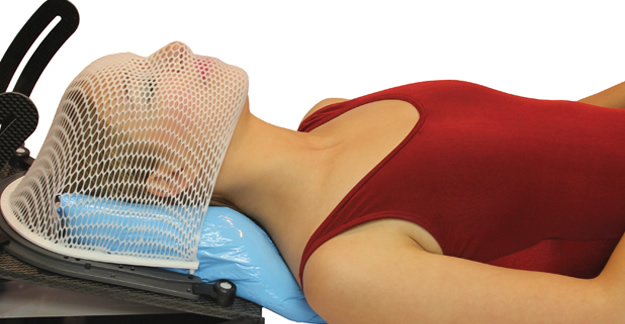At 37 years old and the father of a newborn son, Chris Lavoie found his life turned upside-down with a diagnosis of a tumor on his thyroid. In short order, the Celebration, Florida, man had surgery to remove the thyroid and part of his vocal cord and then received the devastating news that he also had non-Hodgkin lymphoma. Doctor said that he must go under head and neck radiation to detect the problem.
Says Lavoie, “It turned out to be in early stage II.”
Following his thyroid surgery, Lavoie moved on to chemotherapy and then received approximately 40 radiation treatments, given 5 days a week over a period of about 8 weeks. The radiation therapy was targeted at Lavoie’s neck and was anything but comfortable. “I was fitted for a large face mask that was basically used to lock my head and neck into place during radiation. These are not fun for anyone that is claustrophobic. The actual radiation was targeted all around my neck area. They used a pretty sophisticated machine so it was able to generate more radiation in certain areas and less radiation in surrounding areas.”
 The positioning of the mask is of utmost importance in order to protect surrounding areas as much as possible, explains Leslie Smith Grima, RN, an oncology nurse for Dartmouth-Hitchcock Medical Center in Lebanon, New Hampshire. “Patients wear a hard net mask that extends from the top of the head to the mid-shoulder. The patients are placed into the mask and then secured to the XRT table to make sure that there is no movement during the treatment.”
The positioning of the mask is of utmost importance in order to protect surrounding areas as much as possible, explains Leslie Smith Grima, RN, an oncology nurse for Dartmouth-Hitchcock Medical Center in Lebanon, New Hampshire. “Patients wear a hard net mask that extends from the top of the head to the mid-shoulder. The patients are placed into the mask and then secured to the XRT table to make sure that there is no movement during the treatment.”
Despite the high-tech precision of the equipment and the careful precautions taken by medical staff, radiation still comes with some potential side effects that can be serious, and not all patients know about them in advance.
Browse This Article
Who is Affected?
An estimated 60,000 Americans are diagnosed with head and neck cancers each year, including cancers of the larynx and thyroid, according to the American Cancer Society. The standard of care for treating these cancers is surgery, when possible, followed by radiation. Using radiation in such a small, sensitive area often proves problematic, however, leaving patients to cope with severe side effects, including an inability to swallow and chew food, and potentially a diminished quality of life. Chronic fatigue, malnutrition and dental disease can, at times, seem insurmountable.
Tom, who was diagnosed with HPV-positive squamous cell carcinoma of the head and neck, maintains that he was neither prepared nor fully educated on these possible side effects. His wife, Peggy, says that “while [we were] apprised of the clinical definition of all the side effects of such a high-dose radiation protocol, we were not made fully aware of how that translates into real-life experience.”
Common Side Effects of Radiation
Tom’s side effects, according to his wife, ranged from severe fatigue, an inability to swallow food along with the resulting weight loss, and even an inability to have blood drawn. According to the American Cancer Society, other common side effects and coping strategies that can be taken include:
- Malnutrition: Nearly all of the side effects of radiation therapy for head and neck cancer may contribute to malnutrition. If possible, work with a nutritionist to select healthy food and drink choices that are digestible. If simple suggestions to treat malnutrition aren’t enough, you may need a feeding tube, which will require a hospital stay. Sometimes patients who grow anxious about their inability to eat may benefit from drugs for anxiety or depression.
- Swallowing difficulty: Caused by neck tenderness and swelling, and/or from damage to the tongue and mouth, this reaction can last 3 to 6 months or be permanent.
- Jaw and mouth stiffness: This side effect usually improves. Radiation therapy can stimulate an overgrowth of fibrous tissue (fibrosis) in the skin and in the mucous membranes, muscle and joints of the jaw.
- Nausea and vomiting: Immediately following radiation, chewing and swallowing will be severely impaired. Patients can try consuming liquid food, baby food and ground regular foods. Ideally, they should focus on consuming foods high in nutrients and consider liquid supplements.
- Hormonal/reproductive disorders:Men may discover they have a reduced sperm count while premenopausal women can experience irregular periods for up to a year following neck radiation.
Other common side effects from radiation therapy to the head and neck can affect various parts of the body and can have an impact on 25% to 100 percent of patients. The National Cancer Institute has a list of just he oral side effects of head and neck radiation therapy, and they include:
- Salivary Gland Hypofunction and xerostomia: dry mouth from lack of saliva, more than 93% of patients experience this reaction. With certain types of radiation therapy, this reaction can occur in 100% of patients.
- Dysgeusia: also called parageusia, this bad taste in the mouth is experienced by 66.5% of patients.
- Oral Fungal Infection: 37.4% of patients report having a fungal infection in their mouth following head and neck radiation.
- Tismus: lock jaw, not being able to open the mouth completely, is reported by 25.4% of patients.
- Dental Disease: Following head and neck radiation, 24% of patients note the development of some issue with their teeth and gums.
Reducing the Risk of Head and Neck Radiation
While neck radiation can cause serious side effects, there are steps you can take in advance to lessen these adverse reactions.
“The goal when prescribing and delivering radiation therapy as part of a patient’s treatment plan is to reduce the risks as much as possible,” says Kamal M. Patel, MD, doctor of radiation oncology at Cancer Treatment Centers of America at Midwestern Regional Medical Center in Zion, IL. “However, when radiation therapy is indicated as a treatment option, patients may experience some acute side effects, including fatigue, sunburn and blistering of the skin, as well as a severe sore mouth and throat. Patients can also experience some long-term side effects, such as skin fibrosis or ulceration, hypothyroidism, permanent problems with swallowing, permanent dry mouth, risk of permanent damage to the jaw/TMJ, life-threatening vessel perforation, brachial plexopathy, spinal cord paralysis and risk of secondary malignancies.”
Some side effects are not immediately apparent. For example, Lavoie’s side effects were not bad for the first week or two, but they slowly worsened as the treatments continued. “There was little to no pain until the end of the treatments, when my skin felt like it had a really bad sunburn. The two worst side effects were that the radiation basically killed my salivary glands so I always had a dry mouth and throat.” He was advised to use a mouth rinse made specifically for dry mouth, to drink as much water as possible, and to use a toothpaste with a high fluoride concentration because a lack of saliva can cause tooth decay. It takes about 2 years for saliva levels to return to pre-radiation levels.
For Lavoie, the worst side effect was losing his sense of taste. “It seemed to happen all at once, and I could not taste anything,” says Lavoie. “The foods and drinks that I usually enjoyed tasted like metal. It was so difficult to force food down when it tasted so bad. I went from weighing 185 pounds to 150 pounds during the treatments. I did my best to drink protein and supplement shakes but everything tasted so bad it was difficult to do. They had discussed giving me a feeding tube so that gave me some motivation to eat. It was several months after I completed radiation that my sense of taste slowly came back.”
Tom’s experience was similar. “What nobody told us about the salivary gland destruction, is that without these glands, eating is such a struggle that people lose interest,” explains Tom’s wife Peggy. “Tom must swallow 1 to 2 cups of water with every meal just to force the food down. This means he often fills up on water before he is actually finished eating the amount of calories he needs to gain weight.” Tom did find one nutritional supplement called Orgain, which was developed by a physician and fellow cancer survivor, to be beneficial. Still the situation grew worse for her husband, says Peggy, when he became weak from not eating enough and could no longer exercise, something he’d once enjoyed.
Fatigue — down to the bones exhaustion — is another radiation side effect. “We knew there would be fatigue,” says Peggy. “What we didn’t learn until months later is that Tom’s lack of energy is essentially chronic, and that a man who used to live very efficiently on less than 6 hours of sleep a night now needs well over 8 and even that is not sufficient to sustain the level of activity he needs to do his job and normal daily activities.”
According to the American Cancer Society, cancer-related fatigue is very different from the everyday variety of tiredness that most people experience at some point. This type of fatigue can last from months to years and continues after treatment ends. Sleep doesn’t make it better. Many people describe it as overwhelming, affecting every part of their lives, and say that it is the most distressing side effect of cancer and its treatment.
Can Head and Neck Radiation Side Effects Be Prevented?
While radiation may be necessary to successfully treat someone with head and neck cancer, you may not have to endure the full impact of its challenging side effects.
“Be proactive in order to stay ahead of the side effects and address them early on — or even before they happen” notes Dr. Patel.
For instance, he says, when a patient is scheduled for surgery, he or she should work with a physical therapist to boost strength ahead of time. That, in turn, may help facilitate the recovery process. To help prevent dental problems, seeing a dentist one month before radiation begins is also advised. “We encourage our patients and their families to come prepared with questions. I encourage patients, going back to the time of diagnosis, to inquire about all of their options. Knowing your options and the potential side effects of a particular treatment puts the patient in the driver’s seat.”
Because patient care does not end when treatments ends, Dr. Patel encourages his patients to ask their healthcare team members, “How are you going to support me once my treatment has ended and I go home?”
“A follow-up care plan is very important for patients and their families,” he says.
He and other experts encourage patients to consider alternative and nutritional therapies. Many major medical centers now offer alternative therapies on their menu of treatment options, as more research suggests they are beneficial. While an alternative therapy may or may not be able to replace a conventional one, it certainly can work in conjunction with traditional medicine to lessen potential side effects and their subsequent damage.
“In our clinic, we have a Reiki practitioner, two massage therapists and nutritionists that work with our patients,” says oncology nurse Grima. “Patients seem to enjoy and benefit from the treatments. As for herbs and medicines, patients are encouraged to avoid herbal remedies during treatment, since all ingredients may not be listed, and because most herbal remedies are not regulated. If a patient requests to continue their herbal medicine it is discussed with the treating doctor and they make the final decision and provide an explanation to the patients.”
Tom is currently working with an acupuncturist and Chinese medicine specialist to try to undo some of the damage from his treatment. Part of this damage was another surprise when he recently went to have his blood drawn and the phlebotomist couldn’t get a sample, a radiation reaction the technician said was common. Grima disagrees and says that while this effect is possible, it is not the norm. It may be, she says, “that people who have pre-existing blood issues could become dehydrated and therefore have increased viscosity of their blood. I see radiation causing a decrease in platelets and therefore a decrease in clotting ability. I am sure that there are the few that have an odd reaction, but it is definitely not the norm or a frequent occurrence.”
While not everyone undergoing radiation therapy will experience all the same side effects, being proactive, doing your own research, seeking alternative therapy professionals and asking questions — until you get thorough, thoughtful responses — will help head off some of radiation’s effects and possibly prevent some permanent ones. After all, while the primary goal of radiation is to prolong life, patients also hope they will maintain a good quality of life following radiation.
Chris Lavoie sums up his experience this way: “My neck area is still sensitive to the sun so I have to make sure I put sunscreen on. The entire process changed who I am. It humbled me and took away that invincible feeling. It also made me see how fragile life is and we all need to take time to appreciate the small things in life. My son was born on March 25, 2013, and I was diagnosed with cancer within weeks of him being born. It went from the best day of my life to the worst in a short period of time. The treatments took a large toll on me and I went through a year of hell and did not always have the energy to enjoy my son when he was a newborn. At the same time, he was my rock and what gave me the strength to fight through all of this.”
For More Information
- Side Effects of Radiation Therapy (Cancer.net)
- Radioactive iodine (radioiodine) therapy for thyroid cancer (American Cancer Society)
- Oral Complications of Chemotherapy and Head/Neck Radiation (PDQ®) (National Cancer Institute)
- Head and Neck Radiation Treatment and Your Mouth (NIH National Institute of Dental and Craniofacial Research)
- Radiation therapy for laryngeal and hypopharyngeal cancers (American Cancer Society)
- Head and Neck Cancer (American Academy of Otolaryngology)






